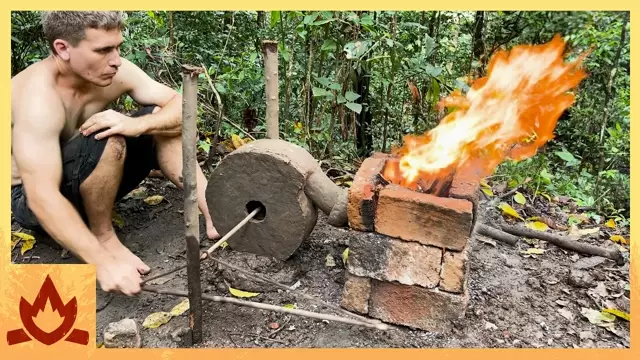2024-02-01
[public] 959K views, 119K likes, dislikes audio only
Primitive Technology: One Way Spinning, Rope Stick Blower
Subscribe: http://bit.ly/subPT | Never miss a video! Enable ‘ALL’ Notifications!
Watch my newest content: https://youtube.com/playlist?list=PLGnWLXjIDnpBR4xqf3FO-xFFwE-ucq4Fj&playnext=1&index=2
Follow Primitive Technology:
Wordpress: https://primitivetechnology.wordpress.com/
Patreon: https://patreon.com/user?u=2945881
Watch More Primitive Technology:
Newest Uploads: https://youtube.com/playlist?list=PLGnWLXjIDnpBR4xqf3FO-xFFwE-ucq4Fj&playnext=1&index=2
Pyrotechnology: https://youtube.com/playlist?list=PLGnWLXjIDnpBVRqu5lz5JGaQxjPs7q3CJ&playnext=1&index=2
Shelter: https://youtube.com/playlist?list=PLGnWLXjIDnpBBsdKZb-vy30o88SIxItp2&playnext=1&index=2
Weapons: https://youtube.com/playlist?list=PLGnWLXjIDnpA-XGDrrmVgBnSXx15i2Awp&playnext=1&index=2
Popular Videos: https://youtube.com/playlist?list=PLGnWLXjIDnpAb29Lrdki5BPjTpMon8zla&playnext=1&index=2
About This Video:
I made a type of forge blower that spins continuously in one direction only, driven with a simple rope and stick, using a novel technique I developed. The rope, wrapped around the rotor, is pulled down and back via the stick on the power stroke, tightening and causing the rotor to spin clockwise. The stick is then lifted up towards the rotor and pushed forward on the return stroke, loosening the ropes grip around the rotor, allowing it to continue to spin in the same direction due to its momentum. The cycle is then repeated producing uninterrupted, one way, high speed rotation.
Until now the blowers I made intermittently spun clockwise, stopped, and then turned anti clockwise driven either by a stick and rope mechanism or by a string passed over a groove in the top of the rotor (see start of video). Energy was wasted each time the rotation was halted and reversed. This also meant that only symmetrical blower housings could be used, more efficient volute shaped housings could not. But with the new operating technique producing one way rotation, a volute shaped housing was built and tested, working as intended.
The other change to the blower was that it is now mounted vertically rather than laid out horizontally. The rotor is suspended between two upright stakes that have a single hole partly bored into each of them. These hold the ends of the rotor, acting as thrust bearings. This simple frame allows the rotor to spin freely.
The new blower will be used for iron smelting and will be compared with the older blower designs. The potential advantages are better efficiency and ergonomics. Less effort seems to be expended due to the continuous momentum being conserved through each cycle. Also, one hand is left free during use which might be an advantage during forging (i.e. using tongs, adding charcoal etc.). The disadvantage is that it's less portable than the original, the wooden stakes need to be driven into soft ground meaning there's less places it can be used. But this is a negligible issue if the forging area is permanent.
Contents:
00:00 Current blower design (spins both ways)
00:35 Frame for new blower
03:33 Making rope
05:28 Making fan spokes
07:10 Setting up the mechanism
07:35 One way spinning technique
08:33 Fan blades
09:40 Test with old symmetrical housing
14:29 Making new volute shaped housing
21:57 Setting up new housing
23:52 Testing with new housing
About Primitive Technology:
Primitive technology is a hobby where you build things in the wild completely from scratch using no modern tools or materials. These are the strict rules: If you want a fire, use a fire stick - An axe, pick up a stone and shape it - A hut, build one from trees, mud, rocks etc. The challenge is seeing how far you can go without utilizing modern technology. I do not live in the wild, but enjoy building shelter, tools, and more, only utilizing natural materials. To find specific videos, visit my playlist tab for building videos focused on pyrotechnology, shelter, weapons, food & agriculture, tools & machines, and weaving & fiber.
#PrimitiveTechnology #ForgeBlower #Pyrotechnics
/youtube/video/bS4_K5_tHbg?t=0
/youtube/video/bS4_K5_tHbg?t=35
/youtube/video/bS4_K5_tHbg?t=213
/youtube/video/bS4_K5_tHbg?t=328
/youtube/video/bS4_K5_tHbg?t=430
/youtube/video/bS4_K5_tHbg?t=455
/youtube/video/bS4_K5_tHbg?t=513
/youtube/video/bS4_K5_tHbg?t=580
/youtube/video/bS4_K5_tHbg?t=869
/youtube/video/bS4_K5_tHbg?t=1317
/youtube/video/bS4_K5_tHbg?t=1432
/youtube/channel/UCAL3JXZSzSm8AlZyD3nQdBA
/youtube/video/Byd_Mdajqo0
/youtube/video/Csb-AFD58ww

